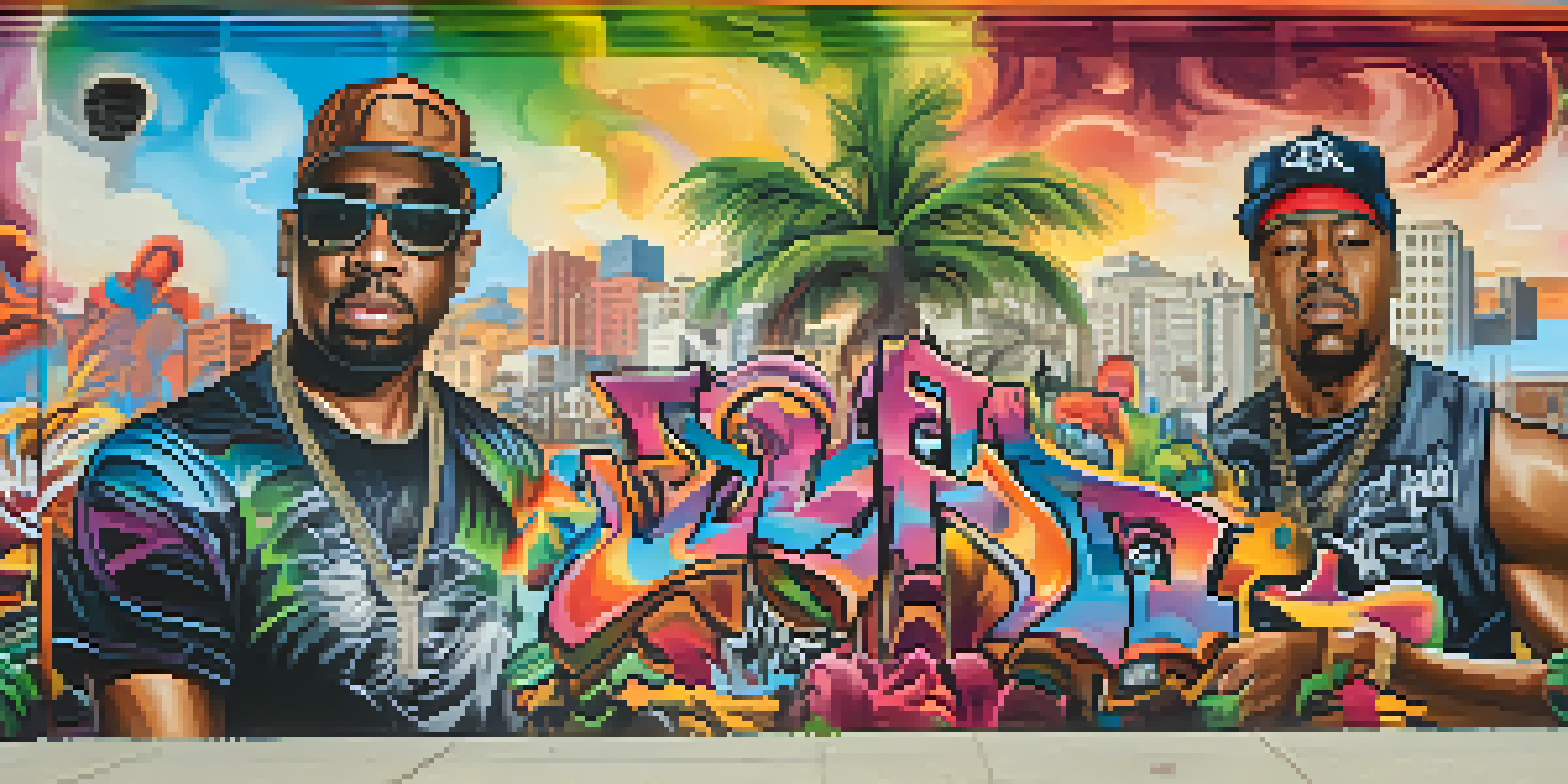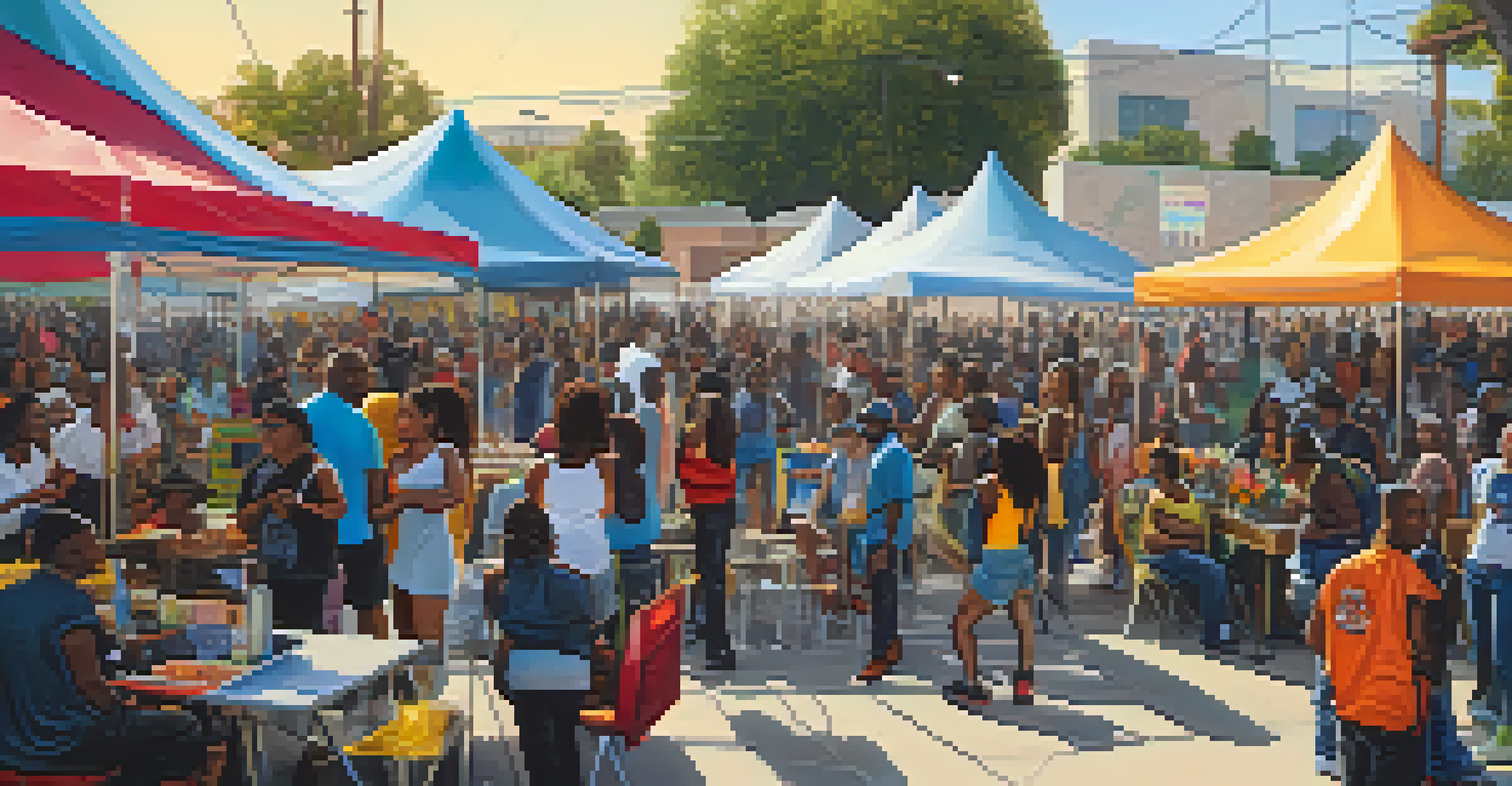Compton's Role in the West Coast Hip-Hop Movement

The Origins of Hip-Hop in Compton
Compton, a small city in Los Angeles County, became a pivotal hub for hip-hop in the late 1980s. This was a time when the genre was still finding its voice, and artists in Compton were eager to tell their stories. The unique socio-economic conditions in the area, along with a rich cultural backdrop, provided fertile ground for hip-hop to flourish.
Hip-hop is a vehicle for change, a way to express the struggles of the marginalized.
Many early artists in Compton drew inspiration from their environment, infusing their music with raw narratives that reflected the realities of life in the city. This authenticity resonated deeply with audiences, helping to establish a distinct West Coast sound that contrasted sharply with the East Coast scene. Compton's vibrant community provided the perfect canvas for these artists to express their struggles and triumphs.
As the sounds of Compton began to gain traction, local artists started to gain national attention, paving the way for a revolutionary shift in hip-hop. The city became synonymous with a style that was both gritty and real, laying the groundwork for the West Coast's rise in the hip-hop hierarchy.
Key Artists That Shaped Compton's Sound
Artists like N.W.A and Dr. Dre were instrumental in putting Compton on the hip-hop map. N.W.A's groundbreaking album 'Straight Outta Compton' not only showcased the city's talent but also highlighted the social issues that plagued its residents. The raw and unapologetic lyrics struck a chord with many, making the group an emblem of West Coast hip-hop.

Dr. Dre's production skills and vision transformed hip-hop music, incorporating funk and soul elements that became hallmarks of West Coast sound. His ability to craft catchy beats paired with powerful storytelling changed the way hip-hop was perceived, attracting a wider audience. Together, these artists created a legacy that would influence countless musicians for generations to come.
Compton's Hip-Hop Origins
Compton emerged as a crucial center for hip-hop in the late 1980s, driven by its artists' authentic narratives reflecting the city's socio-economic realities.
Moreover, the emergence of artists like Ice Cube and Eazy-E further solidified Compton's status as a hip-hop mecca. Their contributions not only enriched the genre but also established Compton as a breeding ground for future stars, ensuring that its legacy would endure.
Compton's Cultural Impact on Hip-Hop
Compton's influence extends beyond music; it has created a cultural phenomenon that encompasses fashion, language, and lifestyle. The iconic ‘Compton’ hat and the way artists dressed reflected the gritty reality of their environment, becoming symbols of pride for many. This connection to culture helped to elevate hip-hop from mere entertainment to a vital form of expression.
I think the music is the most powerful part of our culture, and it can make a difference.
The stories told through Compton's hip-hop lyrics often highlight issues such as systemic racism, poverty, and police brutality. These themes resonated with many listeners, sparking conversations and fostering a deeper understanding of the struggles faced by marginalized communities. Hip-hop became a voice for the voiceless, and Compton was at the forefront of this movement.
As hip-hop gained global popularity, the cultural elements rooted in Compton began to influence other genres and cultures. This cross-pollination of ideas has created a rich tapestry of music and art that continues to evolve today.
The Rise of Gangsta Rap in Compton
The emergence of gangsta rap in Compton marked a significant shift in the hip-hop landscape. This sub-genre, characterized by its aggressive lyrics and themes of street life, was spearheaded by artists from the city. Gangsta rap not only defined the sound of Compton but also challenged the mainstream perceptions of hip-hop.
N.W.A's 'Fuck tha Police' became an anthem for those who felt oppressed by law enforcement, showcasing the power of hip-hop as a tool for social commentary. The raw honesty of gangsta rap attracted both critics and fans, leading to a polarizing yet impactful discussion about race, violence, and the American experience.
Cultural Impact of Compton
The cultural expressions from Compton, including fashion and language, have transformed hip-hop into a vital form of social commentary and identity.
The success of gangsta rap also opened doors for other artists to explore similar themes while maintaining their unique voices. This gave rise to diverse storytelling within hip-hop, allowing for a more nuanced portrayal of life in Compton and beyond.
Compton's Influence on Future Generations
The legacy of Compton's hip-hop scene has inspired countless artists across the globe. Modern musicians continue to draw from the experiences and styles popularized by their predecessors in the city. This ongoing influence is evident in the music of artists like Kendrick Lamar, who often pays homage to Compton while addressing contemporary issues.
Kendrick's album 'good kid, m.A.A.d city' not only narrates his upbringing in Compton but also revitalizes the storytelling tradition that defined earlier hip-hop. By weaving personal experiences into his music, Kendrick ensures that the narratives of Compton remain relevant and impactful for new audiences.
Moreover, the rise of digital platforms has allowed emerging artists from Compton to showcase their talent without gatekeepers. This democratization of music production and distribution means that the city's influence will continue to evolve, fostering a new generation of voices and stories.
Compton as a Cultural Hub Today
Today, Compton remains a vibrant hub for hip-hop culture, with a thriving music scene that celebrates its rich history. Local artists are continually pushing boundaries, experimenting with new sounds while staying true to the narratives that define the city. This blend of tradition and innovation ensures that Compton's musical legacy is both preserved and evolved.
Community events and festivals often celebrate the city's contributions to hip-hop, bringing together artists and fans alike. These gatherings serve as a reminder of Compton's enduring spirit and its role in shaping the broader hip-hop landscape. They foster a sense of belonging and pride, reinforcing the city's identity within the genre.
Legacy of Gangsta Rap
Gangsta rap, pioneered by Compton artists, reshaped hip-hop's landscape by addressing harsh realities and challenging mainstream perceptions of the genre.
Furthermore, as hip-hop becomes increasingly global, Compton's influence can be seen in various music styles worldwide. The city’s impact exemplifies how local stories can resonate on a universal scale, proving that Compton's role in hip-hop is far from over.
Conclusion: Compton's Lasting Legacy in Hip-Hop
In conclusion, Compton's role in the West Coast hip-hop movement is undeniable. The city has produced a wealth of talent and has been a catalyst for change within the genre. Through its artists, Compton has told stories that resonate with many, offering a lens into the complexities of urban life.
As we look to the future, it's clear that Compton will continue to influence and inspire. The stories and sounds birthed from this city have laid the groundwork for a diverse and rich hip-hop culture that will thrive for years to come. Compton is not just a place; it’s a legacy that lives on through music.

The evolution of hip-hop, spurred by Compton's unique contributions, serves as a powerful reminder of the genre's roots in storytelling and social awareness. As new generations of artists emerge, they carry forward the torch lit by their predecessors, ensuring that Compton's influence will endure in the ever-changing landscape of music.